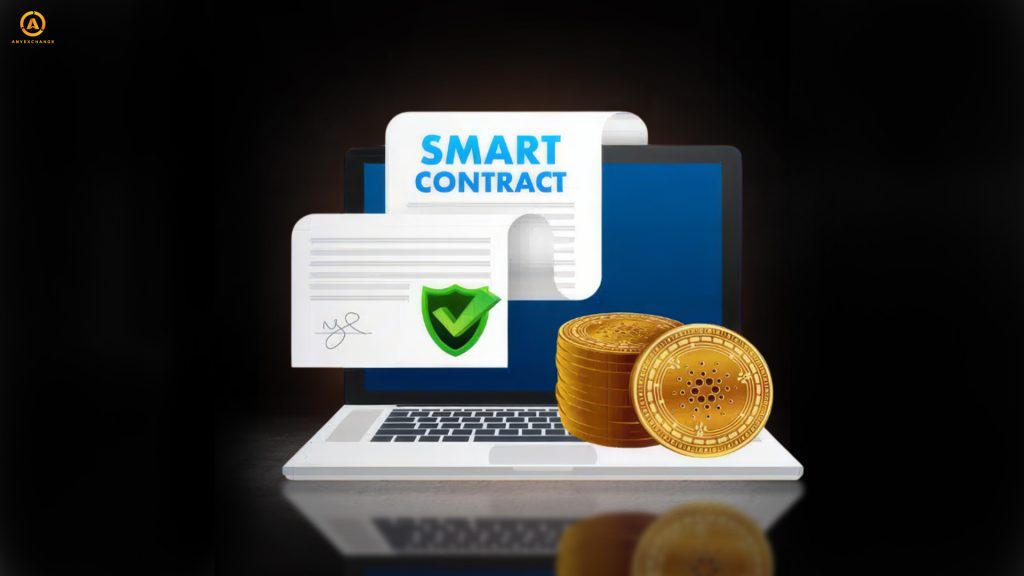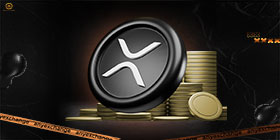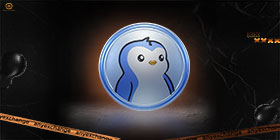
We usually associate the concept of smart contracts with financial transactions on the blockchain. And this is true, because the idea of “smart contracts” was realized precisely thanks to the development of blockchain systems and cryptocurrencies.
Today, we can already observe the use of this self-executing software algorithm in other areas of human activity. For example, managing access rights through smart contracts or automating agreements through smart contracts is becoming an invisible functionality used in logistics, insurance, public administration, science, education, healthcare and many other industries.
Let’s take a closer look at what smart contracts are, why this component of blockchain technology is so seamlessly integrated into various processes, and what functions smart contracts can perform (or are already successfully performing) in non-financial areas.
What is a smart contract?

A smart contract is a digital, self-executing software algorithm that confirms the fulfillment of the terms of an agreement between two or more parties when certain events occur. A smart contract replaces an intermediary by removing elements of centralized control from the chain of interaction. All terms and conditions of a transactional agreement between parties are programmed into it and cannot be changed once it is deployed.
Smart contracts automate the fulfillment of the parties’ obligations, ensuring their anonymity and providing the security inherent in all decentralized systems. This technology works autonomously, without human intervention, and has been successfully applied to any process that requires automatic control over the fulfillment of contract terms. Smart contracts are a hybrid of agreement and code designed to automatically perform specific tasks when predefined conditions occur.
They can be created and used by anyone. They are immutably stored on the blockchain, just like other transactions. Their code is open, so the construction logic, current state, and history of each can be verified. The most popular and versatile smart contract platform is Ethereum, with Solana, Polkadot, Tezos, NEO, Algorand and Tron also widely used as alternatives. Smart contracts are typically written in Solidity, Vyper and Rust, but other programming languages are also applicable for this purpose.
The concept of self-executing contracts owes its birth to Nick Sabo, a computer scientist, programmer and legal expert who, according to the crypto community, is one of the main candidates for the role of the mysterious Satoshi Nakamoto. In the early 1990s, Sabo proposed a systеm in which contracts could be entered into using electronic registries without the involvement of a lawyer. Counterparties fulfilled their obligations — the deal was done. With the advent of bitcoin, decentralized payments became possible, the concept was developed, and in 2015 it was fully implemented on the Ethereum platform. By the way, Vitalik Buterin was the first to start talking about the fact that blockchain technology is potentially applicable not only in financial transactions, emphasizing the benefits of smart contracts outside the financial sphere.
What non-financial sectors are using smart contracts today?

Today, we see the successful implementation of smart contracts in processes that involve the execution of typical repetitive tasks under predefined conditions. In such cases, smart contracts rеplace lower-level specialists who perform routine tasks: clerks, agents, accountants, assistants. The use of smart contracts makes it possible to optimize business processes, significantly reduce costs, increase transparency, improve security, and minimize human factor risks. The technology is most useful for companies that interact with a large number of suppliers and customers. In particular, it is already actively used by major retailers, manufacturers, and marketplaces such as Unilever, IKEA, Nestle, Ford, Amazon, Alibaba Group, and others.
Let’s take a look at some of the areas where these practices are being successfully applied.
Logistics
Logistics involves extensive document flow and clear synchronization of all processes. The use of smart contracts in logistics is one of the most obvious examples of their usefulness. Employees in the process of moving goods need to monitor all checkpoints in real time and be able to adjust them. Smart contracts take a huge burden off the logistician by reducing administrative tasks and red tape. An automated and transparent process greatly improves coordination and reduces the risk of abuse and fraud.
As an example, consider the calculations of Unipart Group, a British logistics company that has implemented smart contracts in its business processes. According to its analysts, each typical delivery involves around 200 interactions between 30 different parties. Each of these events carries the risk of human error, forgery, and fraud. By automating processes with smart contracts, they can almost completely eliminate these risks.
Smart contracts in supply chain management are already being used successfully in cross-border trade. On the one hand, they greatly simplify customs clearance procedures for carriers, and on the other, they bring international freight transport out of the shadows for governments. Logistics giants such as Maersk have already implemented this approach.
Manufacturers are also integrating smart contracts into their supply chains as they seek to provide consumers with complete information about the origin, storage, and movement of products to build integrity around sustainability, legality, and other regulations. A successful example of a blockchain platform that provides consumers with comprehensive product information from producers is the IBM Food Trust network.
Registration of rights to real and personal property
Legal smart contracts and contract automation are successfully implemented through public registries. The transfer of ownership rights in case of death of the owner, division of inheritance, activation of a sale transaction, mortgage or the fact of donation is recorded and takes effect automatically.
Leasing
The use of smart contracts in the leasing of real estate and cars has shown excellent results. The mechanism is roughly as follows:
- The landlord and the tenant sign a smart contract for a certain period of time.
- The tenant makes a payment.
- The doors of the rented property or the car in the car-sharing program are automatically unlocked.
- If the next payment is not made, the smart contract locks the doors.
Smart contracts in healthcare

Data management through smart contracts allows patients to access the services of various specialists in a timely manner. All health information is stored on the blockchain and instantly updated when necessary (changes in condition, medical reports, test results, etc.).
Interaction with insurance companies is also simplified: the legal consequences of insured events occur many times faster when smart contracts are used in insurance. All necessary documents are automatically pulled into the systеm, and the collection of required signatures can take place virtually simultaneously.
Smart contracts in government
Government organizations can use blockchain to speed up the flow of documents, reduce bureaucracy and virtually eliminate corruption. Through digitized interaction, all documents and approvals are linked to a separate smart contract, the terms of which cannot be deleted or changed. Now, many countries are also testing the use of smart contracts in elections for transparent and fair elections.
The use of smart contracts in the energy sector has taken an interesting form. They allow consumers to exchange surplus green energy, bypassing the intermediaries of traditional suppliers. Such exchanges support the growth of localized renewable energy networks and enable consumers to express themselves in sustainable energy initiatives.
Smart contracts and intellectual property
The automation of agreements using smart contracts is a widely used tool on digital authoring and art trading platforms. Art smart contracts are designed to enable fast and secure transactions with NFTs confirming copyright rights. Blockchain protocols can be used to manage patent and trademark rights and enable automated enforcement of license agreements.
Smart contracts in education

In an ideal model, smart contracts can be used to implement and record in blockchain the entire educational process, from the entrance exams with recording the results of their passing, to the end of all semesters, up to the defense of the diploma. Thus, a single database of all applicants, students and teachers can be created, where complete information about all the results of educational processes will be stored in an unchanged form.
Advantages of smart agreements
- Autonomy. The absence of intermediaries in the form of brokers, lawyers, employees of government agencies, etc. speeds up and reduces the cost of all processes, while eliminating the risks associated with the human factor.
- Security. Advanced cryptographic methods used in distributed registry systems guarantee increased confidentiality and protection of stored documents.
- Transparency. Smart contracts provide a single, shareable and secure copy of the contract, creating an environment of complete trust.
- Immutability. The blockchain’s transparency and open source nature of smart contracts preclude data adjustments for falsification and ensure complete trustworthiness.
- Speed. No need to visit banks, offices, institutions and administrations saves hours, days and months. Automated transactions take no more than a couple of minutes to close.
Disadvantages
- Lack of regulation. To date, there are no full-fledged legislative norms in the sphere of regulation and taxation of transactions with the use of such protocols. In March 2023, the EU passed initiatives in the form of the Data Bill containing clauses concerning smart contracts and the Internet of Things (IoT). However, they have not yet become comprehensive.
- Impossibility to make changes. Smart contracts cannot be changed once they are in force under newly arisen circumstances. This flaw in the technology can be the cause of hacker attacks due to the discovery of a vulnerability.
Conclusion
So, we see that the technology, until some time realized only in the cryptocurrency environment, finds its application in other areas. Its undeniable advantages give mankind the opportunity to save time, money and nerves in many areas of both business and personal life.
Thank you for your attention. Conduct only safe financial transactions!
AnyExchange is an exchanger through which you can convert popular cryptocurrencies at the most favorable rate. The site also offers fast and anonymous money transfers all over the world.





